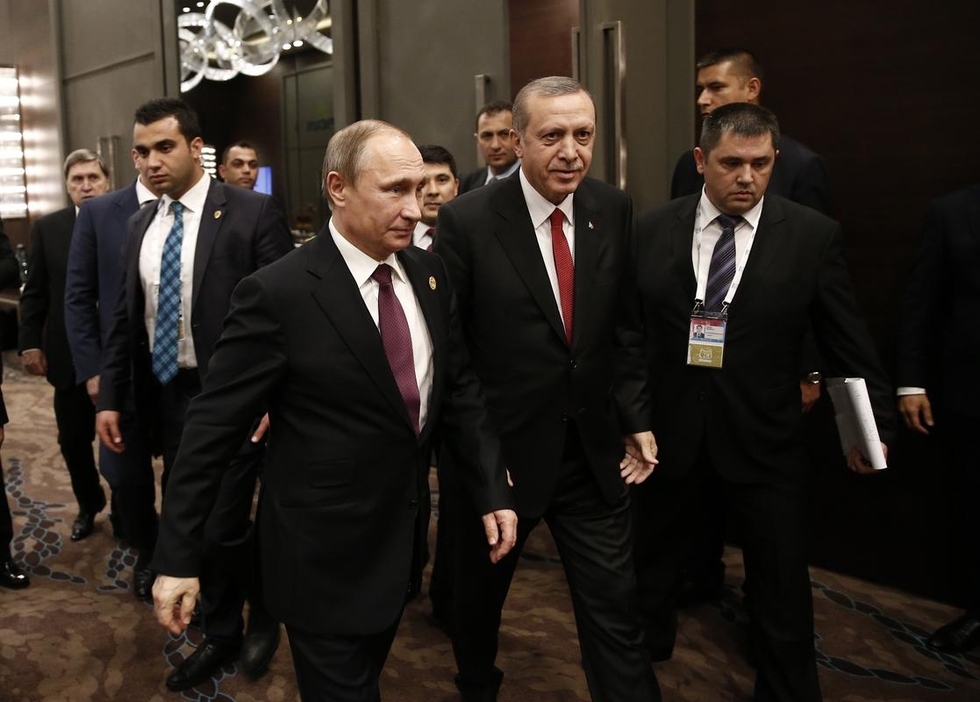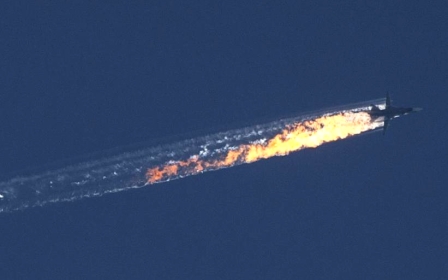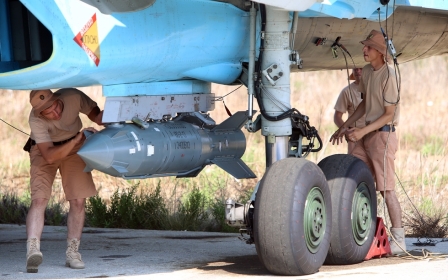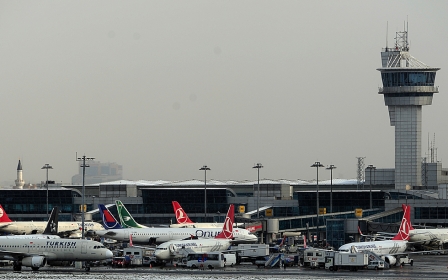ANALYSIS: After Russia jet downed, Turkey in no mood for a climb down

The downing of a Russian jet over the village of Yamadi in the north-western Syrian border province of Latakia early on Tuesday morning is the culmination of nearly two months of growing tension between Russia and Turkey.
Strains in the relationship began when Russian troops moved into Syria at the end of September to relieve pressure on the faltering government of Syrian President Bashar al-Assad. Since then, Turkey has regularly claimed that Russian jets were entering Turkish airspace and made frequent protests to the Russians.
The most recent warning came only five days ago on 19 November. Delivered to the Russian ambassador and military attaché in Ankara, it followed strikes on Turkmen settlements, held by the Syrian opposition, close to the Syrian border by Russian jets. By then, Turkey and Russia were engaged in constant exchanges intended to avert an incident in which a plane would be brought down. The downing of the jet on Tuesday comes just a day before the foreign ministers of Russia and Turkey were due to meet for talks in Istanbul.
Though Russia has consistently denied any infringements of Turkish airspace, accidental or otherwise, Turkish diplomats say that in Moscow, officials have been privately somewhat more forthcoming, suggesting an element of "derring-do" on the part of their pilots. After the Russian jet came down at 9:20am (7:20 GMT) on Tuesday, the Turkish General Staff announced that it had been given 10 warnings in the space of five minutes before action was taken.
Be that as it may, Russia reacted swiftly and strongly on Tuesday to news that the jet had been shot down and its two pilots forced to land by parachute among Syrian Turkmen, one of them apparently being killed during the descent. Russia denies that there was any infringement of Turkish airspace and has called for an emergency meeting of the UN Security Council.
Russian President Vladimir Putin’s response to the news was exceptionally harsh by the standards of international diplomacy, especially when it is born in mind that, until recent weeks, he and Turkey’s president, Recep Tayyip Erdogan, have met frequently and been regarded as friends, sometimes even as kindred spirits.
“The loss we suffered today came from a stab in the back delivered by accomplices of the terrorists,” Mr Putin declared. This follows cryptic remarks he made at the G20 Forum in Antalya last week alleging that some unnamed countries there were providing financial support to IS. This looked like an unmistakable dig at Turkey. So alongside questions about the short-term consequences of the shooting down of the plane, there is also a more serious one about whether a significant rift is opening between Turkey and Russia and how long it could last.
Turkey and Russia, historical enemies before the late 20th century, with Tsarist Russia for two centuries seeing the Ottoman Empire as a target for conquest and eventual annexation, today have close economic links, especially in the field of energy. Severing these or even reducing them would be painful for both countries, but perhaps more so for Turkey which imports at least half its natural gas from Russia.
But mending fences is likely to be difficult with policies of the two countries in Syria in direct conflict. Neither looks likely to change course. Since 2011, Turkey has channelled aid to the Syrian opposition in an attempt to bring down the Assad government and replace it with a Sunni regime. In the last few years, there have been persistent allegations of Turkish supplies reaching IS. This year, Turkey’s rhetoric has toughened and Erdogan has spoken out strongly against IS though until very recently, there seemed to be a tendency in Ankara to suggest that it is an offshoot or ally of Turkey’s other enemies, Kurdish nationalists, or Assad’s forces.
"Regime change" in Syria is an aspiration that Turkey can hardly give up after nearly five years of making it an absolute priority in foreign policy and the admission of 2.3 million Syrian refugees onto its soil. If Russia manages not just to prop up but also to consolidate a viable Syrian rump state under Assad, this is something that Ankara will find very hard to live with.
It will also have to consider the radical strategic implications of having a strong Russian military presence on its southern border - a totally novel and potentially very troubling situation for Turkey and a major advantage for Russia, though so far there seems to have been little discussion of this in Turkey, where all eyes are on combating Assad’s supporters.
By contrast, Russia seems to be playing out carefully thought-out moves. In September, it received President Erdogan on an official visit, just a few days before going into Syria – but gave the Turks no hint of what was in store, making the intervention when it happened even more bitter news for Ankara. Since then, Russia has also stepped up its informal military alliance with Iran over Syria with Putin meeting Iranian leaders in Tehran on Monday, in his first visit for over a decade.
Turkey, too, is now turning to its allies. Its immediate reaction to the crisis will be, as it has been several times before, to try and seek solidarity from its Western partners in NATO. After the Russian ambassador was summoned to the Foreign Ministry in Ankara on Tuesday, it was the turn of the US, British and French ambassadors, as well as the Chinese ambassador.
NATO has several times declared that it will stand firmly beside Turkey, but Western governments have to consider the reaction of their own politicians and public opinions to anything that might turn the Turkish-Syrian frontier into a flashpoint.
Meanwhile, Turkey and Russia are sizing up the form that their diplomatic protests should take against each other. The visit of Russian Foreign Minister Sergey Lavrov to Istanbul, scheduled for Wednesday, has been cancelled. Russian citizens have also been warned against travelling to Turkey because of an alleged growing threat from terrorism.
It looks as if Turkish-Russian dialogue, even behind the scenes, is severely constricted perhaps even to breaking point. However, Ankara is no mood for a climb-down.
New MEE newsletter: Jerusalem Dispatch
Sign up to get the latest insights and analysis on Israel-Palestine, alongside Turkey Unpacked and other MEE newsletters
Middle East Eye delivers independent and unrivalled coverage and analysis of the Middle East, North Africa and beyond. To learn more about republishing this content and the associated fees, please fill out this form. More about MEE can be found here.




